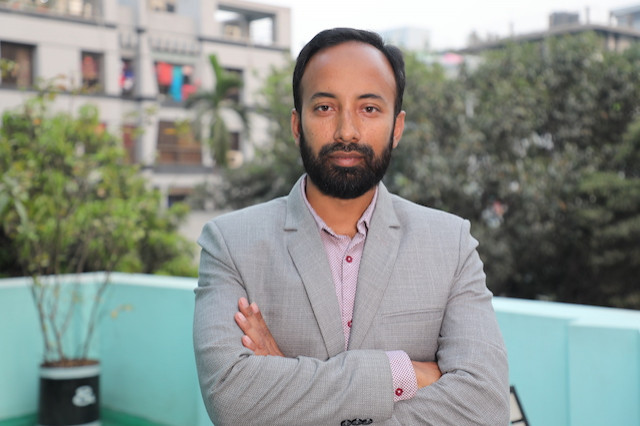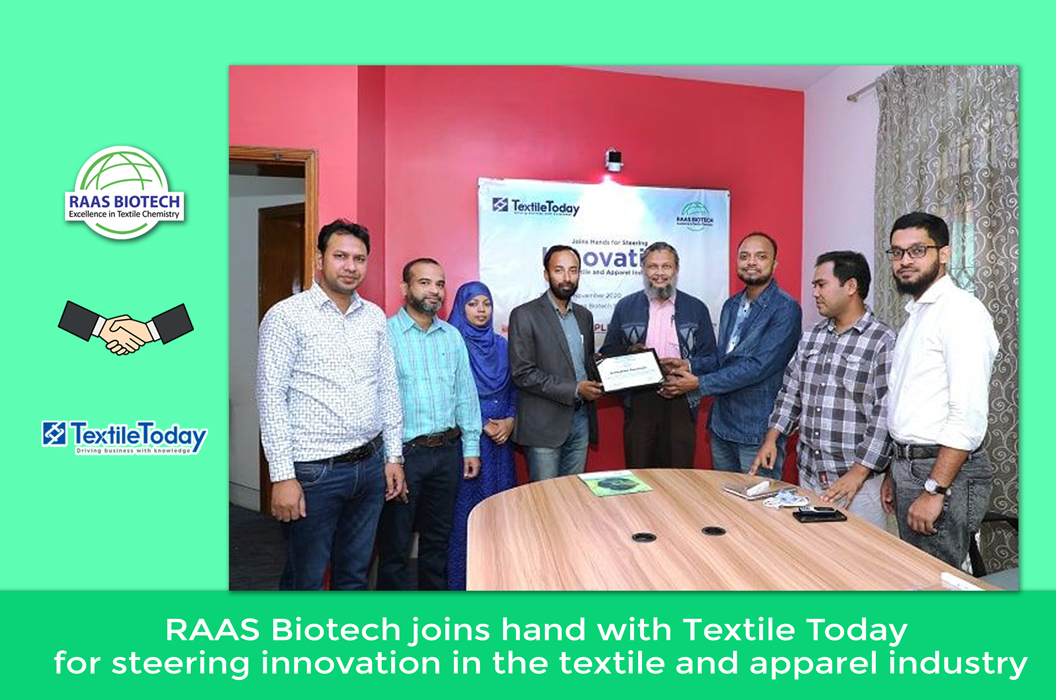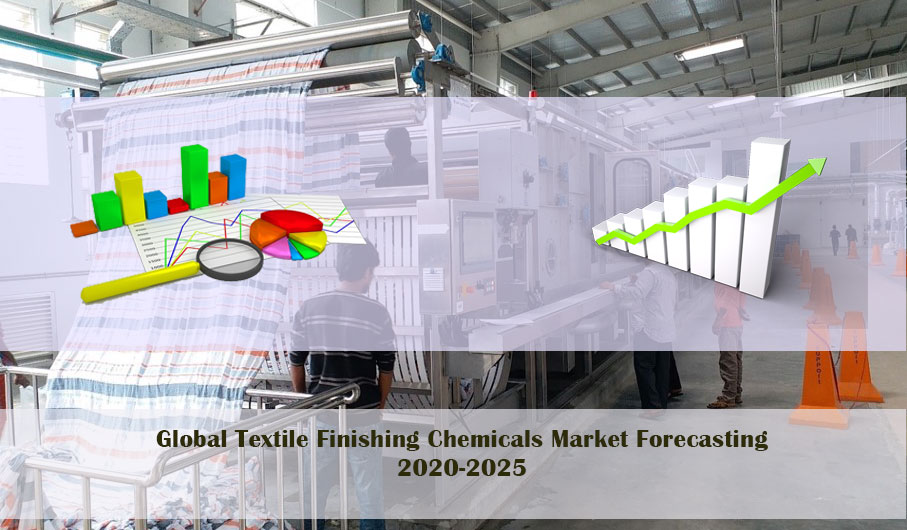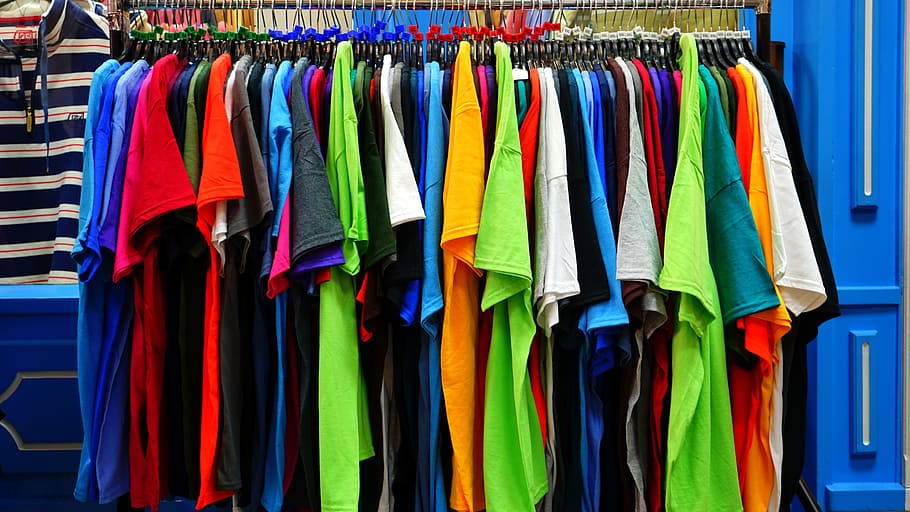Phone
+60183101186
E-mail: info@raasbiotech.com
28th Aug, 2023

Raas Biotech was incepted in 2010 as a supplier of textile chemicals to textile dyeing and washing factories. As a textile dyeing chemical manufacturing company, they are sourcing their products from Germany, Malaysia, Korea and China. With a strong R&D and quality control department, Raas Biotech is serving the industry with its high-performance, water and energy-saving products as well as process and innovative products.
Aux & Hue is a leading dyes supplying company in Bangladesh and the local agent of Raas Biotech. Recently in a conversation with Textile Today, Rashidul Islam Russel, Managing Director, Aux & Hue has shared the cost rising and its impact on dyes-chemical suppliers, their solutions for the textile industry, etc.
Textile Today: Currently, the textile and apparel industry is observing a huge decline in orders. The cost is rising and dyes-chemical suppliers are getting cost reduction pressure too. How do you evaluate this whole scenario?
Rashidul Islam Russel: If we see the back the COVID-19, most of the countries in the world offered huge incentives as most of the businesses were stagnant at that time. European countries, America and Bangladesh offered incentives during the COVID-19 to continue the business. So, there was a huge cash flow which later on created inflation. High inflation is making the price higher and negatively impacting our garments sector. So, each product is addressing higher costs while the chemical sector is also facing the same.
Another incident – the Russia and Ukraine war – accelerated the situation more. Now the situation in Europe is dire. They see fashion as a second option now. As a result, we see a big impact in this market. Orders are dropping. Especially since we supply more garment products to Europe and America, our orders are coming less due to the damage in those places. The same thing is observed in the case of dyes and chemicals. When the price of everything increases, the price of raw materials or chemicals also increases. But the industry wants to do cost-cutting more here which is why manufacturers are putting pressure on us to survive with competitive prices in the world market.
Textile Today: Now customers prefer durable garments. To increase the life cycle of a garment, dyestuff and chemical solution providers have a bigger role to play. Kindly elaborate on the aspect.
Rashidul Islam Russel: In some production processes harsh chemicals and high temperatures are used, also many processes are repeated. It reduces the life cycle of the fabric. If we can reduce the use of harsh chemicals, process time and repetition, then the fabric's durability will increase. We have been working since 2012 as a chemical supplier to alternate harsh chemicals like caustic soda which damages the fabric. We are working on alternative chemicals, which have developed low-temperature and enzymatic processes. So that we do not have to use harsh chemicals and high temperatures. Also, it requires less processing time. There are more chemical suppliers who can contribute to making a change in the chemical supply chain.
Textile Today: Bangladeshi manufacturers are gradually moving from cotton to synthetic garments. What are you thinking about it?
Rashidul Islam Russel: From the context of durability, I want to come to the point that now a consumer wants his purchased product to last for a longer time. Look synthetic or cotton both are the same thing for us but synthetic is taking over the market faster. The amount of resources or time it takes to process cotton is much higher whereas nylon or polyester requires fewer natural resources. So, the need for synthetic fibers in the process is growing.
In the case of Bangladesh, both nylon and cotton have to be imported. So, it should go where the fashion is moving. Cotton, synthetic, and cotton-synthetic blends are the fashion trends and as a chemical supplier, we have the opportunity to bring new developments. There was a system where polyester reduction cleaning followed by cotton part dyeing took a longer time. This is where we come up with a new solution where we offer a normal wash and end up using a wash-off agent that contains reduction cleaning chemicals while washing. Thus you have two processes - reduction cleaning and cotton part dyeing at the same time. Here you are significantly reducing time and improving fastness with our product.
Textile Today: As we know Raas Biotech is an innovation and R&D-based company. What innovative solutions is Raas Biotech offering for the factories to be more water and energy-efficient?
Rashidul Islam Russel: We have had a vision since our inception: ' Less water and Impact product making and convert harsh chemical process to Eco-friendly processes’. Here in our product lineup, you will find the line of products where we have an imprint of this process right from pre-treatment to finishing. Our enzymatic solution which has replaced the caustic and peroxide base harsh pre-treatment process long ago and is performing very well in our factories.
During this gas crisis, customers are trying hard to get our products. Where higher temperatures are required for wash-off. It is possible to wash with our wash-off agents at low temperatures of 50-60 degrees centigrade. We have developed cold-water-soluble softeners to reduce the cost of high temperatures during this gas crisis. We are working on pre-treatment, and dyeing finishing at every place. And we are very popular in the industry for the methods and chemicals we use in washing for reduction cleaning.
Textile Today: How a factory can reduce dyes and chemical costs by using sustainable chemicals. And how can they save the environment?
Rashidul Islam Russel: This is a big concern for our industry. We should be concerned from every end to ensure the sustainability of our industry. We were a bit luxurious earlier but now the gas crisis has become acute. If we want to be sustainable, we should focus on water energy and develop a process that shortens the time.
We offer a branch of products to our customers and many can use it to reduce their costs significantly. And it's not just a green process, it creates a huge impact on cost. If you can reduce gas consumption in your process by 50-60 percent, your process time is reduced by 1 to 2 hours, or if you can reduce water consumption. Eventually, it will go a long way in reducing your cost.
Not only that, your increased productivity adds to your income. I invite our technical persons to use the products of chemical companies that address natural resource issues in this sector. We can achieve sustainability only if they use these products with an open mindset.
Textile Today: How do you see the coming days of business?
Rashidul Islam Russel: Bangladesh has many challenges and some geopolitical issues. China is a big player in the garment industry but a cold war with America has always been a boon for us. And day by day the trust of America and European countries is increasing in us. Still, we have many challenges to face. Our industry is progressing, expert human resources are being generated, and we are emerging as a mature industry but we still have many areas to work on. We can become more sustainable through process development, synthetic line extension and optimal use of natural resources. The people of Bangladesh are very hardworking, they have already proved that. I hope this trend will continue in the coming days.
But my area of ??concern is that the big companies are picking up huge orders while the smaller companies are lagging behind. However, this is a feature of a capitalist economy. But if this continues, small companies may disappear in the near future. Despite all this, my hope is that even though the days ahead will be more challenging, we will survive well and contribute more to the export sector with our huge potential garment industry.
Source: Textile Today Bangladesh

“We convert harsh chemical process … <span style="color: rgb(119, 119, 119); …

RAAS Biotech joins hand with … Malaysia based leading textile chemical …

Global Textile Finishing Chemicals Market … Global Textile Finishing Chemicals Market …

Raas Biotech appoints Aux & … Raas Biotech Sdn. Bhd. announced …

RAAS Biotech Launches New and … Green Cotton Process STDP Process …